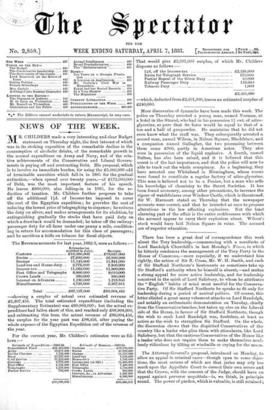There has been a great deal of correspondence this week
about the Tory leadership,—commencing with a manifesto of Lord Randolph Churchill's in last Monday's Times, in which he bitterly condemns the management of the Tory Party in the House of Commons,—more especially, if we understand him rightly, the action of Sir R. Cross, Mr. W. H. Smith, and such of Sir Stafford Nortlicote's lieutenants as sometimes take up Sir Stafford's authority when he himself is absent, —and makes a strong appeal for more active leadership, and for leadership conceived in the spirit of Lord Salisbury, to whom he attributes the " English " habits of mind most needful for the Conserva- tive Party. Of Sir Stafford Northcote he speaks as fit only for leadership during a period of neutral politics. Of course, this letter elicited a great many vehement attacks on Lord Randolph, and notably an enthusiastic demonstration on Tuesday, chiefly from the Conservative benches, but taken up also on the Liberal side of the House, in favour of Sir Stafford Northcote, though the wish to snub Lord Randolph was, doubtless, at least as active as the wish to strengthen Sir Stafford. On the whole, the discussion shows that the dispirited Conservatives of the country like a leader who plies them with stimulants, like Lord Salisbury, but that the cautious Conservatives of the House like a leader who does not require them to make themselves need- lessly ridiculous by tilting at windmills or crying for the moon.


































